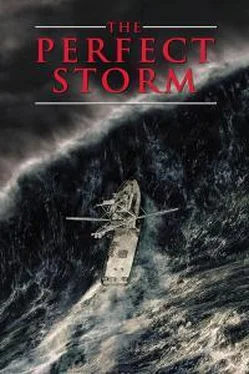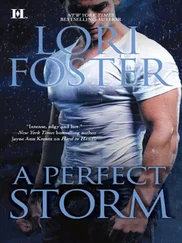Sebastian Junger - The Perfect Storm
Здесь есть возможность читать онлайн «Sebastian Junger - The Perfect Storm» — ознакомительный отрывок электронной книги совершенно бесплатно, а после прочтения отрывка купить полную версию. В некоторых случаях можно слушать аудио, скачать через торрент в формате fb2 и присутствует краткое содержание. Жанр: Триллер, Проза. Описание произведения, (предисловие) а так же отзывы посетителей доступны на портале библиотеки ЛибКат.
- Название:The Perfect Storm
- Автор:
- Жанр:
- Год:неизвестен
- ISBN:нет данных
- Рейтинг книги:3 / 5. Голосов: 1
-
Избранное:Добавить в избранное
- Отзывы:
-
Ваша оценка:
- 60
- 1
- 2
- 3
- 4
- 5
The Perfect Storm: краткое содержание, описание и аннотация
Предлагаем к чтению аннотацию, описание, краткое содержание или предисловие (зависит от того, что написал сам автор книги «The Perfect Storm»). Если вы не нашли необходимую информацию о книге — напишите в комментариях, мы постараемся отыскать её.
The Perfect Storm — читать онлайн ознакомительный отрывок
Ниже представлен текст книги, разбитый по страницам. Система сохранения места последней прочитанной страницы, позволяет с удобством читать онлайн бесплатно книгу «The Perfect Storm», без необходимости каждый раз заново искать на чём Вы остановились. Поставьте закладку, и сможете в любой момент перейти на страницу, на которой закончили чтение.
Интервал:
Закладка:
Usually the only thing I had in front of me during these conversations was a beer, though occasionally, if the conversation looked promising enough, and I'd established a good rapport with the guy, I'd pull the steno pad out from behind my jacket. Otherwise, I'd periodically excuse myself the men's room, which—given the evening's activities—was usually necessary anyway. There I'd scribble down a few stories and then I'd go back out into the bar. When I'd really become friendly with someone, such as Chris Cotter, I'd ask if I could interview them with a tape recorder, out of the bar, someplace where we could talk without being interrupted. Usually they said yes. One guy said yes, but tried to give me the slip while I was following him in my car through town. I finally tracked him down at the Green Tavern, and we ended up talking for three hours. And a few people—like Ricky Shatford—would have nothing to do with me at all.
Ricky was angry about his brother's death, he told me later, and I was something to focus all that on. He didn't like me writing about his family, and he didn't like me writing about something I couldn't know for sure. The Andrea Gail had been lost without a trace. Why not just let it lie there?
Unfortunately, Ricky was articulating exactly my own insecurities about the project. Every time I ventured into the Crow's Nest, I felt like an intruder, and I'd had several excruciating dreams about the loss of the Andrea Gail. In one, I dreamed I'd drilled tiny holes in her hull before her last trip to see if she'd still float; and in another I dreamed I was in the wheelhouse with Billy Tyne as she went down. I didn't have to die, though, because I was a journalist, and I just looked guiltily on as we plunged into the trough of another enormous wave. My God, you never really stopped to think how terrifying this must have been for those guys, I remember thinking. Those were six real men out there, not just names out of a newspaper. Don't ever forget that.
The one encouraging dream I had was in 1994, when I wrote a magazine article about the Andrea Gail. Most people in Gloucester liked the article, but there were the inevitable dissenting voices, and they traumatized me for months. The idea that you could do as good and thorough a job as possible and still leave people angry at you, shook some long-held illusion about journalism. In the dream I was walking along a deserted beach, and a figure strode towards me down the dunes. It was Bobby Shatford, and he walked up to me and stuck his hand. "So, you're Sebastian Junger," he said. "I've been wanting to meet you. I liked your article."
"Thanks, Bobby," I said. "That means a lot, coming from you."
We'd never loosened our grip, and we just stood there, holding hands. Down the beach, the rest of the Shatford family was having a cook-out. I was headed there, but Bobby couldn't come. He had to stay away.
When I finally talked to Ricky, it seemed as close as I was going to get to shaking Bobby Shatford's hand. Ricky was a fisherman, he was Bobby's older brother, and he'd wanted to kill me. Those are tough hurdles to clear. One summer night in a Gloucester bar, though, we got to talking, and he told me what it was like to lose his younger brother. To me, Ricky had always been the scary older brother who careened around town looking for trouble; now here he was, telling me about the most painful thing in his life. It wasn't an easy thing to listen to.
"When we were kids we were a real close family," says Ricky. "Me and Bobby and Rusty slept in the same bed together. Bobby worked down at the wharf, Bob Brown built the Miss Penny and Looper was running it and I remember one time we were down at Rosie's doing the last-minute preparations and on the way out I yelled to Bobby on the State Fish Pier, HEY BRO! That trip we hit one of the first storms I ever encountered in my life, it was '83 and we were crazy, it was December on the southeast part of Georges and the water was still warm, the Rush was right next to us and they lost every window they had. We gave them our loran to get back home."
A few years later Ricky went down to Florida to run a shark-fishing boat—"I was a highliner back then," he says, "I was damn pretty good with shark." When Bobby and his wife split up, Ricky invited him down to Florida to fish and got him a job on another boat.
At one point the captain didn't show up for a trip, so the owner handed the boat over to Bobby. Ricky and Bobby fished side by side for a while, making a lot of money, and then Bobby ran into his own trouble and wound up back in Gloucester. "I always thought it was safer to go fishing on the Grand Banks for thirty days than stay on land for thirty days," says Ricky. "Bobby and I had some brawls down in Florida, just me against him. We had a club and Bobby and I just destroyed the place—tables, chairs, people."
From Florida Ricky went on to Hawaii. There was a lot of swordfishing in the Pacific, and Ricky was given a state-of-the-art ninety-foot boat and two salaried Filipino crew. In
September, 1991, he called up the Crow's Nest and asked to speak to Bobby. Bro, he said, I got this big beautiful boat, why don't you come out and fish with me?
The owner had even offered to pay Bobby's plane ticket. Bobby declined. "He said he was really in love with this chick," says Ricky. "So I said, 'Alright, I love you, bro,' and he said, 'I love you too.' And that was the last thing we said to each other."
A month later Ricky got the news. He was two days out of Hawaii with all his gear in the water, and he called up the High Seas operator to make contact by satellite phone with the boat's owner, who was fishing off Samoa. The operator told Ricky there was "standby traffic" for him—a call waiting to be patched through—and then she connected Ricky to his boss. The boss said that Bob Brown had been leaving messages on his assistant's answering machine in California. Uh-oh, Ricky thought, standby traffic, a message from Bob Brown . . . something's happened to Bobby.
Sure enough, the standby call was from his sister, Mary Anne. Ricky, I love you, she started off, and then she said that Bobby's boat was missing. "I just figured they were gone," says Ricky. "So I went outside and told my crew, I
said, 'My brother's boat is missing and I think we're just gonna haul the line and go in.' I hauled with tears in my eyes, I was bullshit with God for something like that happening. We got in and got drunk and then I just flew home."
At the memorial service Ricky saw people he hadn't seen in twenty years—friends from grade school, old fishing buddies, mothers from the neighborhood. He stayed in Gloucester a couple of weeks and then went right back out to Hawaii, knocking two windows out of the wheelhouse during a storm on the first trip out. All he could think about was how his mother would feel if she lost two sons instead of just one, and he decided to cut down on his risks. He would go to the Grand Banks no later than October, and even October would be subject to Ethel's approval. "You'll have a choice in the matter," he told her. Still, risk was a difficult thing to avoid, and he even found himself seeking it from time to time. After a few more years in Hawaii he moved back to Gloucester with his wife and started fishing with a man whose father had been lost at sea. The two of them, he said, did crazy things on the boat, fishing late in the season through really severe weather.
"We felt untouchable," was how he explained it. "We felt like there was no way that God could do that to the same families twice."
By the time I talked with Ricky, the book had—against all expectations—become a bestseller, and I was spending a lot of time in Gloucester, staying at the Crow's Nest, showing media people around a town. It was an odd feeling: I remembered Gloucester as a grey, rocky town where I supported myself doing treework and wondering, at age thirty, exactly where my life was going. Now here I was, giving television interviews from the Nest while the regulars tried to ignore the lights and keep drinking their beer. When people said I'd put Gloucester on the map, I replied that it was more like Gloucester had put me on the map. There were any number of people—Chris, Ethel, local fishermen— without whom I could not have written this book. Had they not lived the lives they did, and agreed to talk with me about them, the book would not exist. In that sense, I'm indebted to them; in that sense, the book is as much their work as mine. Writers often don't know much about the world they're trying to describe, but they don't necessarily need to. They just need to ask a lot of questions. And then they need to step back and let the story speak for itself.
Читать дальшеИнтервал:
Закладка:
Похожие книги на «The Perfect Storm»
Представляем Вашему вниманию похожие книги на «The Perfect Storm» списком для выбора. Мы отобрали схожую по названию и смыслу литературу в надежде предоставить читателям больше вариантов отыскать новые, интересные, ещё непрочитанные произведения.
Обсуждение, отзывы о книге «The Perfect Storm» и просто собственные мнения читателей. Оставьте ваши комментарии, напишите, что Вы думаете о произведении, его смысле или главных героях. Укажите что конкретно понравилось, а что нет, и почему Вы так считаете.












